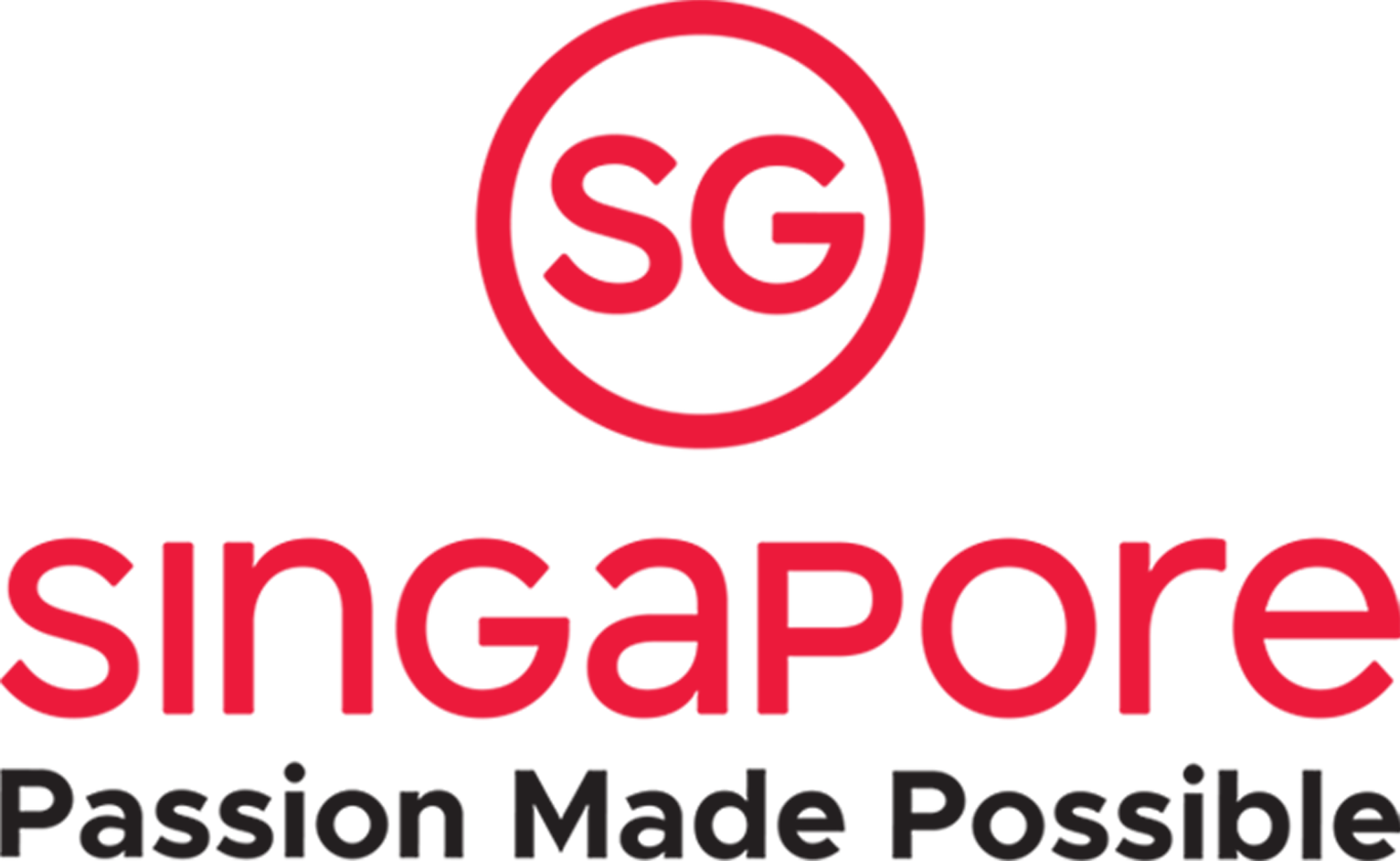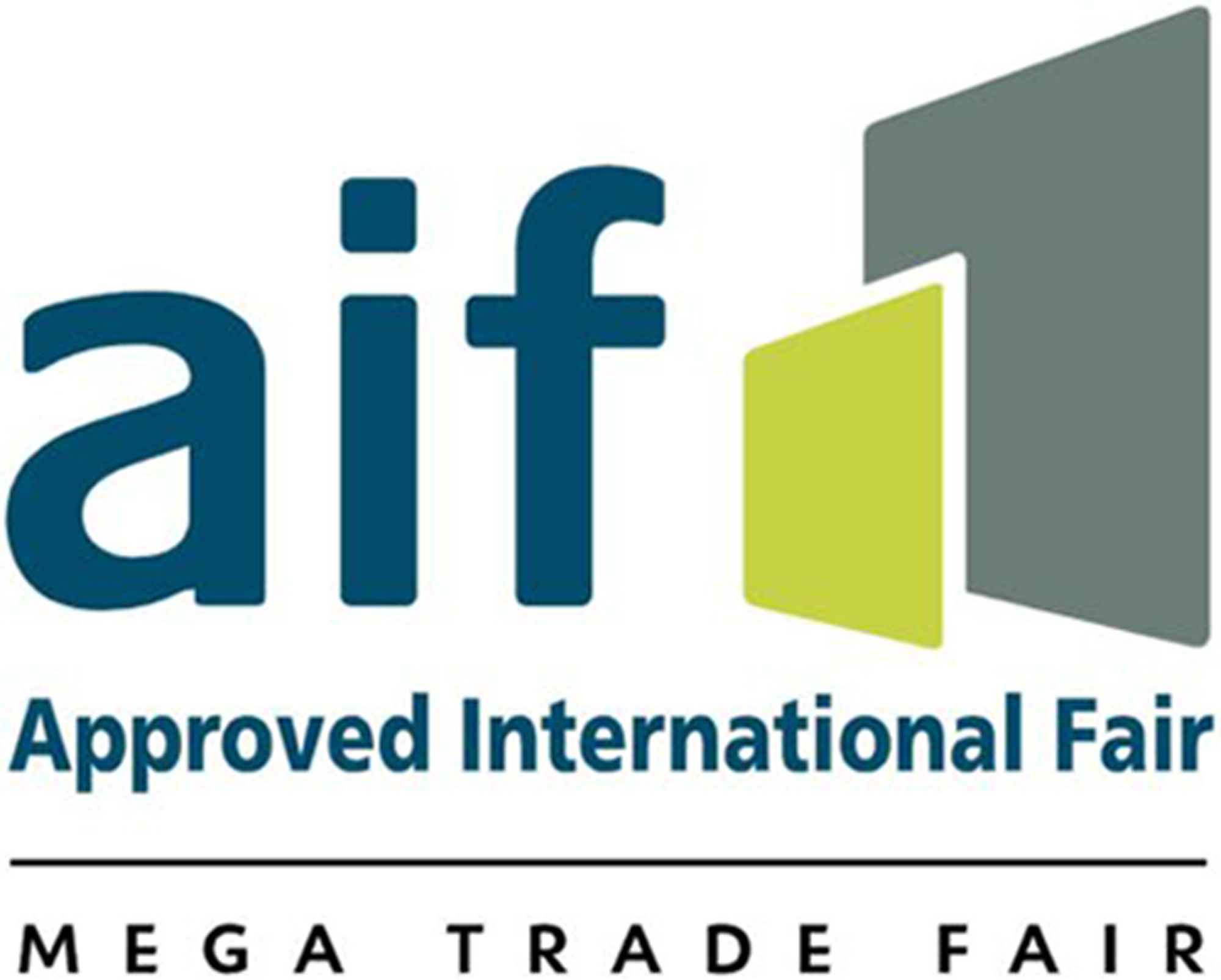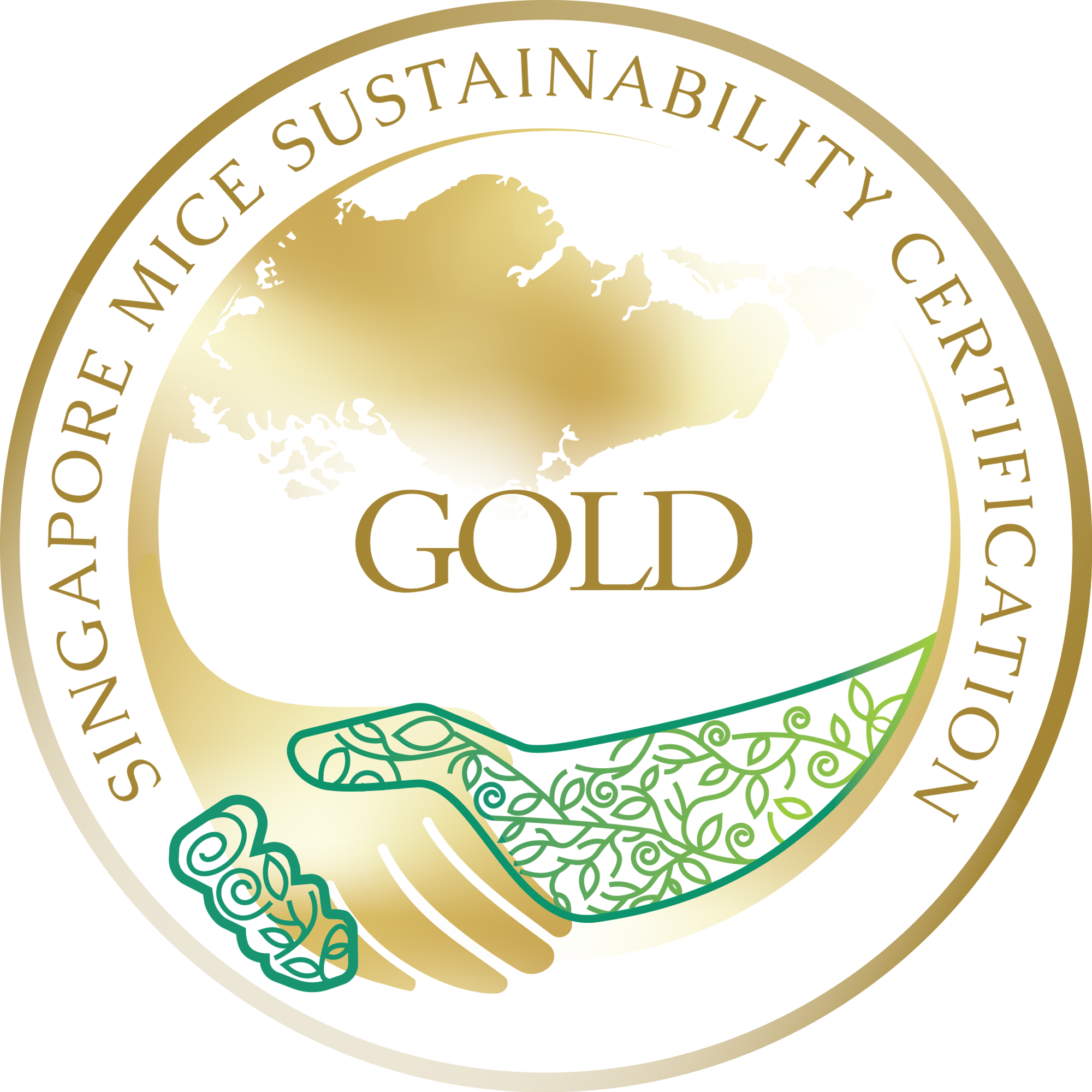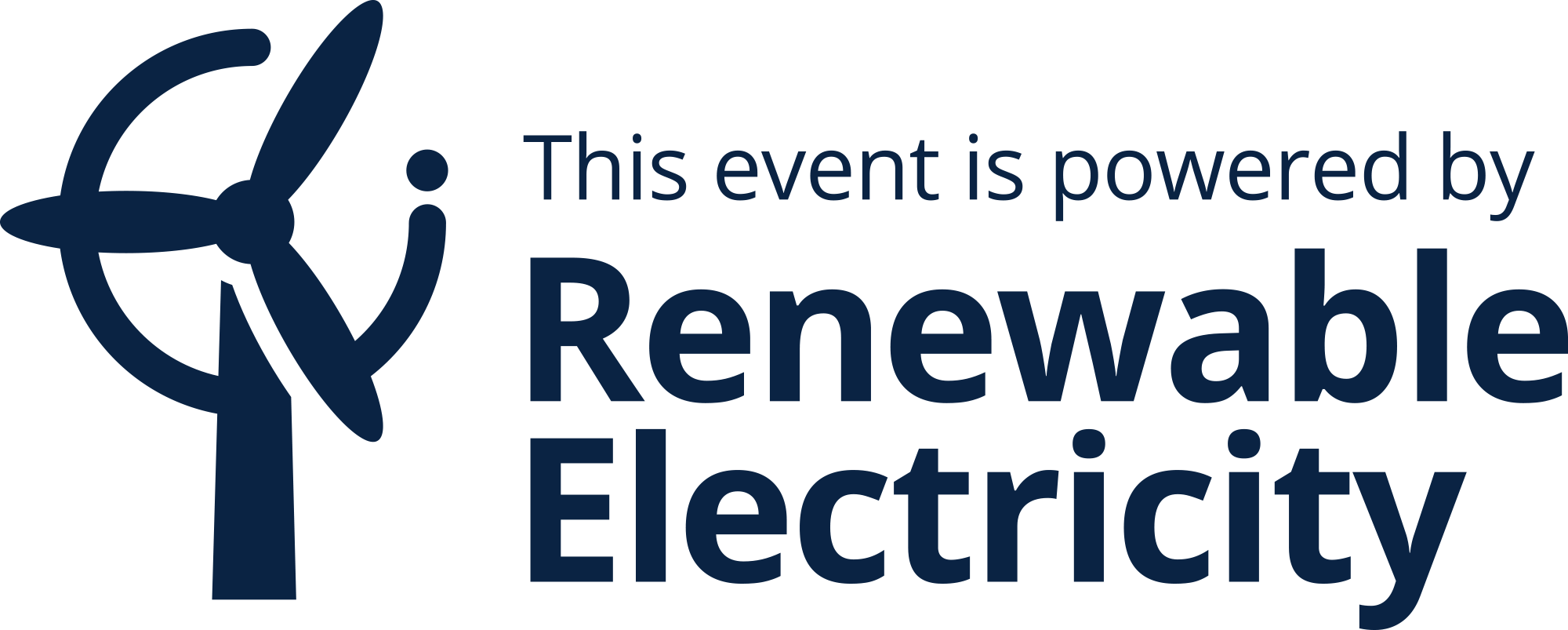When do your guests typically book their stays? Knowing and interpreting the hotel booking window – the period between a reservation and the actual stay- offers valuable insights into guest behavior and booking patterns.
Knowing when guests are most likely to book allows hotels to optimize pricing, maximize revenue, and manage occupancy rates more effectively.
With the right booking lead time strategies, hotels can adapt to guest trends, plan for high and low-demand periods, and create targeted promotions to fill rooms efficiently.
This article will explore how different booking windows impact hotel revenue management, demand forecasting, and inventory decisions, helping you maximize each booking opportunity.
What is a Booking Window?
The hotel booking window is between guests’ reservations and their scheduled check-in date. Interpreting this window is crucial in the hospitality industry because it helps hoteliers predict booking trends and adjust room rates based on demand.
For example, most bookings occur within 14 days of the stay. In that case, a hotel might employ a different pricing strategy than a property that books most guests months in advance.
This period is often called booking lead time and is essential for hotel revenue management. It can be short or long; booking windows allow hoteliers to create specific offers and pricing adjustments that cater to different booking behaviors.
When analyzing booking windows, hotels can optimize their pricing strategy, anticipate occupancy levels, and improve guest satisfaction through personalized offers.
Types of Booking Windows
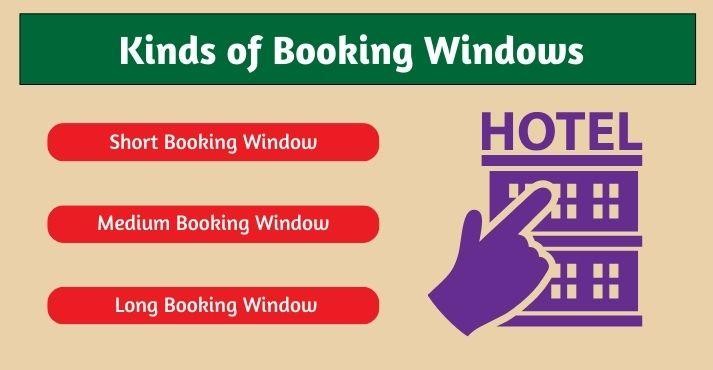
Knowing the different types of booking windows can help hoteliers tailor their approach to attract a wide range of travelers. Booking windows generally fall into three categories:
1. Short Booking Window
A short booking window typically refers to last-minute bookings made within 0-7 days before the stay. These bookings are often made by guests looking for a quick getaway or needing accommodations due to unexpected travel plans.
- Targeting Last-Minute Guests: Hotels can offer last-minute deals or discounts on unsold rooms to attract last-minute bookers. For instance, dynamic hotel pricing adjustments or flash sales can make rooms more appealing to those booking close to their travel date.
- Advantages: Short booking windows allow hotels to fill empty rooms that might remain vacant. When adjusting prices to match demand, hotels can capture last-minute bookings and increase occupancy without compromising revenue.
2. Medium Booking Window
A medium booking window generally covers bookings made 7-30 days before the stay. This window is common among guests who plan their trips but have yet to be far ahead.
- Early-Bird Discounts: Hotels often implement early-bird discount promotions or flexible booking offers that encourage booking within this timeframe to appeal to these travelers.
- Marketing Opportunities: Hotels can send targeted emails or advertisements to previous guests, offering special rates if they book within this period. This strategy allows hotels to maintain steady occupancy levels while optimizing pricing based on anticipated demand.
- Predictable Demand: Medium booking windows provide a more stable revenue stream, as hoteliers have more time to manage rates and adjust based on bookings within this period.
3. Long Booking Window
Reservations made more than 30 days in advance are subject to a long booking window. Guests who book this far in advance typically plan significant events, such as vacations, weddings, or business trips.
- Promotional Packages: Hotels can attract these planners by offering bundled packages with additional perks like complimentary breakfast, room upgrades, or transportation options.
- Predictive Pricing: When analyzing long booking window trends, hotels can predict peak times far in advance, allowing for strategic room pricing to maximize revenue.
- Increased Revenue Assurance: Longer booking windows assure future occupancy, allowing hotels to set prices, manage inventory, and prevent overbooking during high-demand seasons.
Importance of Booking Windows
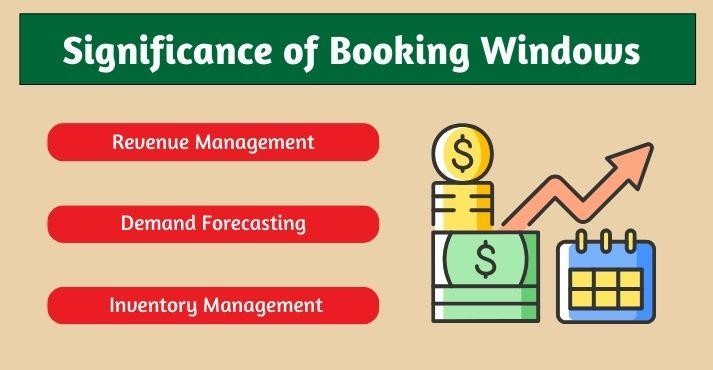
In the hospitality industry, knowing when guests are most likely to book their stay is invaluable.
The hotel booking window—the time between a guest’s booking and their check-in date—offers hotels insight into guest behavior, allowing them to develop effective pricing, inventory, and revenue management strategies.
Understanding booking windows allows hotels to anticipate demand, plan inventory, and create tailored pricing strategies to maximize revenue. Let’s explore how booking windows directly impact revenue, demand forecasting, and inventory management.
1. Revenue Management
A well-understood booking window is crucial for hotel revenue management. By analyzing booking patterns, hotels can optimize their pricing strategy to attract guests while maximizing profits.
Different booking windows—short, medium, and long—allow hoteliers to adjust pricing according to demand fluctuations and availability.
- Last-Minute Premiums: When bookings are close to the check-in date, hotels may implement higher rates to capitalize on limited availability. Travelers booking within a short booking window (0-7 days before check-in) often have fewer choices and are more willing to pay a premium. This strategy allows hotels to charge higher rates while ensuring that last-minute rooms generate maximum revenue.
- Early-Bird Discounts: For long booking windows (30+ days in advance), hotels often offer early-bird discounts to attract guests who plan well ahead. Early bookings provide the hotel with advance revenue, allowing it to project future demand and adjust prices for other booking windows accordingly.
Using booking lead time to guide revenue strategies ensures that hotels maximize profitability across all types of booking windows. This approach also builds customer loyalty, as guests feel rewarded with favorable pricing when they book in advance.
2. Demand Forecasting
Demand forecasting relies heavily on understanding booking windows, which enables hotels to predict occupancy rates more accurately.
By identifying trends in booking patterns, hotels can better prepare for high- and low-demand periods and adjust their pricing strategy to optimize occupancy.
- Peak and Off-Peak Preparation: When analyzing booking windows, hotels can predict how far in advance guests book during peak and off-peak seasons. For instance, the booking window may extend during the holiday season, with guests booking months in advance. In contrast, off-peak periods often see shorter booking windows as guests book closer to their stay.
- Anticipating Booking Behavior: With demand forecasting, hotels can anticipate the types of guests who book within specific windows—leisure travelers, for instance, may book well in advance for vacation planning, while business travelers might book last minute due to flexible schedules. This information allows hotels to segment their target audience and design promotions accordingly.
3. Inventory Management
Effective inventory management of hotels is another key benefit of understanding booking windows. When hotels know how far in advance their rooms will likely be booked, they can better manage room allocation, avoid hotel overbooking, and maximize room availability.
- Room Allocation: Booking windows help hotels determine when to release different types of rooms. For example, during peak periods with high demand, hotels might reserve premium rooms for last-minute bookings, while standard rooms are offered earlier.
- Managing Overbooking: When monitoring booking windows, hotels can control room availability to prevent overbooking—a common issue that can negatively impact guest experience. Using a combination of short, medium, and long booking windows, hotels can stagger room releases to ensure that availability aligns with demand, minimizing the risk of overbooking and ensuring an optimal look-to-book ratio.
- Inventory Flexibility: Some hotels may implement flexible inventory management, where room inventory adjusts based on booking trends within each window. This adaptability allows hotels to allocate rooms strategically, meeting demand without sacrificing the opportunity to accommodate last-minute guests or loyal customers.
Factors Affecting Booking Windows
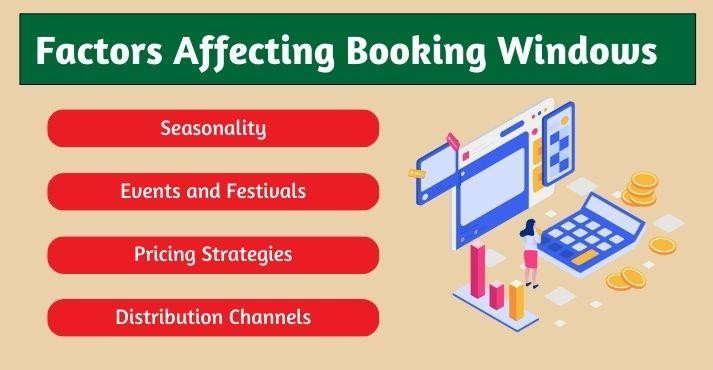
The hotel booking window—the time between a guest’s reservation and their check-in date—is shaped by various factors, which can significantly impact booking behavior.
Understanding these influences allows hoteliers to adapt their pricing strategies, tailor promotions, and better manage inventory. Here’s a closer look at four key factors that shape booking windows:
1. Seasonality
Seasonality plays a crucial role in determining a hotel’s booking window. During peak travel seasons, such as holidays, summer vacations, or popular local events, guests tend to book further in advance to secure accommodations amid high demand.
During these peak times, booking windows can stretch, with travelers booking as early as several months in advance. This longer lead time allows guests to secure their desired room type and take advantage of early booking incentives, such as reduced rates or special packages.
Conversely, off-peak seasons usually see much shorter booking windows. Travelers may feel confident finding available rooms closer to their travel dates, leading to a rise in last-minute bookings.
Hotels can capitalize on this shorter window by offering last-minute deals or flexible booking options to attract spontaneous travelers searching for affordable options.
Recognizing these seasonal patterns allows hotels to align their pricing strategies with demand fluctuations, effectively capturing bookings throughout the year.
2. Events and Festivals
Local events, festivals, and conferences significantly influence booking lead time. Hotels located near event venues or in popular areas experience increased demand around high-profile events, with guests often securing accommodations months in advance to ensure availability and proximity.
For instance, hotels in Singapore often see extended booking windows during the annual Singapore Grand Prix, as international visitors book early to guarantee rooms near the event.
On the other hand, smaller events or regional gatherings may have a more localized impact on booking windows, with attendees booking closer to the date.
In these cases, booking windows are often shorter, as attendees might wait until the last minute, especially if they live nearby and don’t need to plan extensive travel arrangements. This allows hotels to capture event-related demand while managing room availability effectively.
3. Pricing Strategies
Pricing strategies are another decisive factor affecting booking windows, as the pricing approach taken by a hotel often influences when guests choose to book. Various strategies, such as discount pricing or dynamic hotel pricing, target different booking behaviors and lead times.
- Early-Bird Discounts: Offering early-bird discounts or booking offers encourages guests to reserve their rooms well in advance, extending the booking window. These promotions work well for travelers planning vacations or special events, who may be more price-sensitive and responsive to discounts.
- Last-Minute Deals: Last-minute deals are highly appealing to guests booking on short notice. These deals cater to spontaneous travelers and guests with flexible plans, helping hotels fill rooms that might otherwise remain empty. Short booking windows are typically associated with such last-minute offers, as guests prioritize affordability and availability over specific dates or room types.
- Dynamic Pricing: Implementing dynamic hotel pricing allows hotels to adjust room rates based on demand and booking trends. When adapting rates to match high and low booking periods, hotels can encourage bookings across various booking windows and ensure revenue optimization. This flexibility helps hotels attract early planners and last-minute bookers, creating a balanced occupancy flow throughout the booking cycle.
4. Distribution Channels
The choice of hotel distribution channels also significantly influences booking windows. Different platforms’ unique characteristics impact guest booking behavior, creating varied lead times depending on the channel used.
- Online Travel Agencies (OTAs): OTAs often provide flexible cancellation policies, which can extend the booking window as guests feel more comfortable booking early, knowing they can cancel or adjust their plans without penalty. Many travelers use OTAs like Booking.com or Expedia to secure rooms early, particularly during peak seasons or major events. This behavior results in longer booking windows for hotels that rely heavily on OTA bookings.
- Direct Bookings: Hotel direct bookings, typically made through a hotel’s website or booking system, often have a shorter lead time. Hotels that encourage direct bookings through loyalty rewards or exclusive offers tend to see more last-minute bookings, as loyal guests might feel more secure booking directly with the property closer to their travel dates. When offering incentives like loyalty points, discounts, or additional perks for direct bookings, hotels can cater to guests who prefer flexibility while optimizing their booking window strategy.
- Corporate or Group Bookings: For hotels with a substantial number of corporate clients or group bookings, the booking window may vary based on the type of travel. Corporate travelers might have shorter booking windows as they finalize plans closer to the event, while large groups, such as weddings or conference attendees, typically book months in advance to ensure room availability for all members.
Strategies for Optimizing Booking Window
Hotels can optimize their booking window to maximize revenue by implementing targeted strategies:
- Dynamic Pricing Strategies: Adapting room rates based on booking patterns helps maximize revenue. Open pricing allows hotels to adjust prices for different booking windows without adhering to fixed rates, offering flexibility based on demand.
- Targeted Marketing Campaigns: When segmenting guests based on booking behavior, hotels can create marketing campaigns tailored to each window. For example, sending promotional emails with last-minute deals targets short-booking window travelers, while early-bird discounts appeal to long-lead bookers.
- Inventory Management Techniques: Strategic inventory management, such as holding back certain rooms for later release or offering exclusive rates for early bookings, helps optimize occupancy. Overbooking in hotels may also be strategically used to maximize occupancy while minimizing the risk of last-minute cancellations.
Conclusion
In summary, understanding the hotel booking window allows hotels to better manage their pricing, anticipate demand, and optimize room inventory.
By analyzing booking lead time, hoteliers can create targeted promotions that maximize revenue and meet guest preferences.
Effectively managing a hotel’s booking window is an essential component of revenue management and helps hotels stay competitive.
When implementing strategies like demand forecasting, dynamic pricing, and targeted marketing, hotels can boost revenue and provide a smooth booking experience for guests planning their stays at different times.








